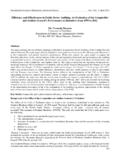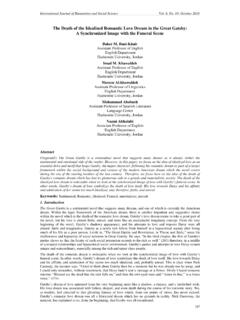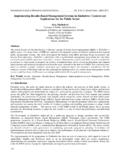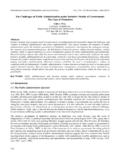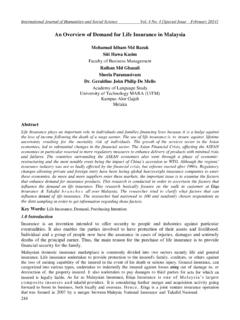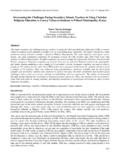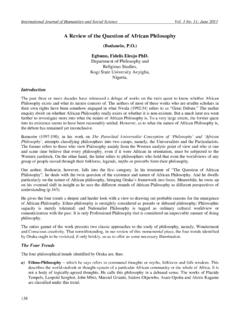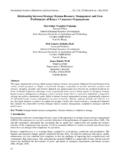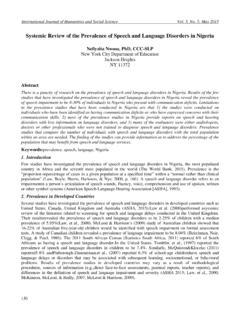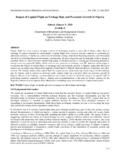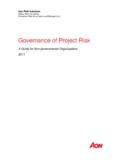Transcription of Prioritizing political banditry than good governance ...
1 International Journal of Humanities and Social Science Vol. 2 No. 24 [Special Issue December 2012] 117 Prioritizing political banditry than good governance : Rethinking Urban governance in Zimbabwe Wellington Jonga Ethiopian Civil Service University Box 5648, Addis Ababa, Ethiopia Abstract Zimbabwe local government system between 1980 and the late 1990 s was robust and envied by many in Africa. However, the birth of multiparty democracy and the fight to remain dominant changed the political landscape and result in the recentralization of administrative authority and political power. political banditry was still borne and was nurtured in various types of incubators until the year 2000 when the Zimbabwean urban communities begun to be victims of a system they failed to condemn at its adoption.
2 The aim of the research is to describe the concept of political banditry , how it is experienced and its effects on the application of democratic good governance in Zimbabwe. Content review was complimented with primary data in this qualitative research. It was found out that political banditry is there and it is perpetrated through, political appointments, restructuring of local institutions, violence, political parties also are supporting informal violent interests groups and recentralization of administrative and political authority and power. The agony is that the urban communities have been marooned or raped by these political violence and administrative aptitudes.
3 Urban communities now cannot tame the beast they helped to create over the years ( political banditry ). It was indicated that representative democracy seems to be a failure in Zimbabwe. The structures are there but they have been captured by political bandits to serve their individualistic interests. Representative democracy needs to be complimented by deliberation so that the people who own government and the ensuing democratic processes could be involved in determining and reviving the institutions, the will, the commitment and the application of democratic good governance in Zimbabwean urban areas.
4 Introduction Zimbabwean urban areas are governed by one law, that is, the Urban Council Act and this legislation has bee changed continuously since independence from the Urban councils Act (Chapter 214), Urban Council Act (Chapter 29:15) and finally to the Local Government Laws Amendment Act, 2008. There is currently effort to change again this Act because the stakeholders believe that the existing piece of legislation gives unlimited powers to the Minister of Local Government. It can also be pointed out that the new constitution under design will attempt to describe the type of local government system good for and applicable in Zimbabwe.
5 The definition of Zimbabwean local government system in the constitution may help to control the authority of the minister concerned. An example is that the Minister responsible for local governments may not be conferred the power or authority to change the Local Government Act without a referendum or approval of parliament. This system of control will greatly bring sanity to the area of local government administration which has become illusive for many years. The changes that were effected so far were dictated by both administrative and political pressures. However, politics has played a considerably big role in changing the dynamics of urban good governance in Zimbabwe.
6 From the 1980 to about 1995 the Zimbabwe African National Union (Patriotic Front) (ZANU-PF) dominated the politics of Zimbabwe. I mean Zimbabwe was basically a defacto one party state and not a de jure not by because the citizens wanted the approach but because of fear of the political system or environment and also because of the previous brutality of the colonial regimes. ZANU (PF) was a better devil politically and administratively than political occupation and colonial racial discriminations that were ultimately portrayed in non-development, segregation in provision of health, education, residential areas in urban areas and the division of the areas outside urban areas into Tribal Trust Lands for Africans and larger Commercial areas for whites colonialists.
7 The Special Issue on Current Trends in Social Science Centre for Promoting Ideas, USA 118 The urban areas and commercial farming areas because they were demarcated for profitable commercial activities, were under direct white colonial administrations and the poor Tribal Trust Lands (later renamed District Councils) had poor soils, rainfall and were tsetse fly infested and these areas were allocated to the blacks. It was this political and administrative segregation that provoke the war of liberation that ultimately end up with the creation of the state of Zimbabwe. Thus from the beginning the majority of Zimbabweans supported the war of liberation with the intension of getting freedom freedom from all oppression from the political systems and institutions that had enslaved them for many years.
8 Freedom was the binding alternative to say the least. However, it seems as if after independence freedom has become evasive as ever. The ZANU-PF Government has changed colours by replacing freedom and development with political banditry , centralization of power, murder, concentration of land and economic privileges in the hands of few ZANU-PF Party cronies and eradication of freedom of speech and association. To sum the political situation it is befitting to say that Zimbabwe has a dictatorship government. This dictatorial approach to governance has left many institutions in limbo either because of financial bankruptcy or administrative incapacity because of too much interference from central government.
9 This research is focusing on how the interventions of the Ministry of Local Government in the local affairs of urban councils has influenced or affect the implementation of good governance in such institutions. What seem eminent is that the Ministry of Local Government has left the decentralization approach in favour of recentralization and political banditry in the administration of local authorities. Democratic decentralization has been preferred for reasons that include administrative, fiscal, and political decision-making. Decentralization is justified if it promotes democratic good governance and furthermore participatory approaches to development.
10 It is also argued by experts that decentralization depending on the specific type adopted can bring government closer to the people and can also enhance communities participation and interaction with local government officers in the affairs of the locality, (Mawhood, 1983, Sharma, 1995, Matlosa, 1998, Olowu, D, and Wunch, 2004, Cheema, 2005). Moyo (2010) expresses that decentralizing governance should not be seen as an end in itself; it can be a means for creating more open, responsive, and effective local government and for enhancing representational systems of community-level decision making.
